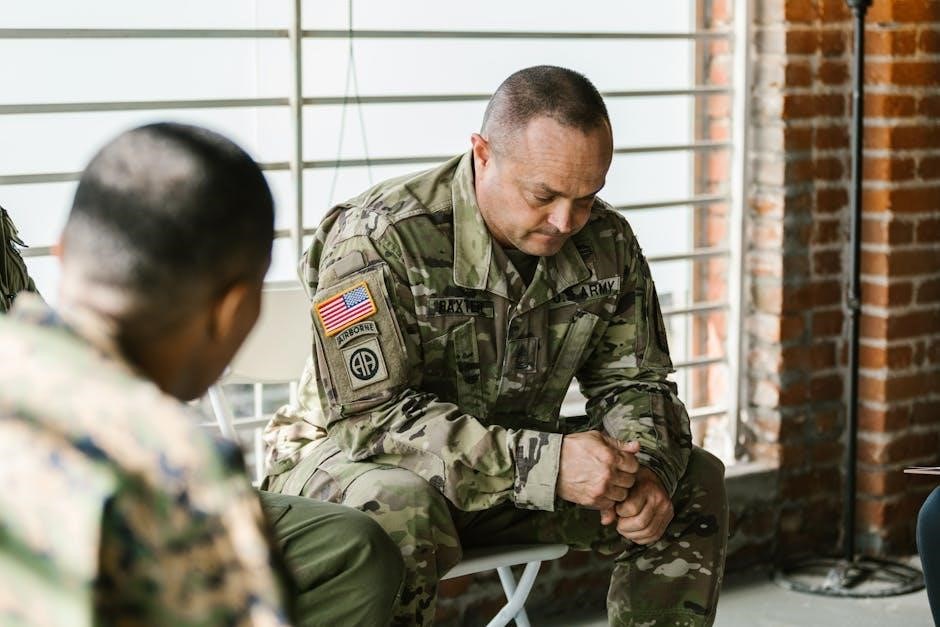Army initial counseling is a foundational process that orients new soldiers, sets expectations, and establishes communication. It is documented on DA Form 4856, fostering a positive command climate and supporting mission success.
1.1 Purpose of Initial Counseling
The purpose of initial counseling is to welcome soldiers to their unit, clarify expectations, and provide a roadmap for success. It introduces soldiers to their roles, responsibilities, and unit standards, ensuring alignment with Army values. This foundational session establishes open communication, addresses potential challenges, and outlines resources for support. By setting clear goals and documenting them on DA Form 4856, leaders help soldiers understand their duties and how their performance will be evaluated; Initial counseling also emphasizes self-discipline, professional conduct, and the importance of maintaining military bearing. Its ultimate goal is to equip soldiers with the knowledge and tools needed to excel, fostering a culture of accountability and readiness while promoting unit cohesion and mission success.
1.2 Importance of Effective Communication
Effective communication is critical in Army initial counseling, ensuring clarity and mutual understanding between leaders and soldiers. It fosters trust, resolves issues, and aligns expectations with unit goals. Clear communication prevents misunderstandings, enhances teamwork, and supports mission success. Leaders must actively listen, articulate expectations clearly, and encourage open dialogue. This promotes a culture of transparency and respect, essential for building strong unit cohesion. Effective communication also helps soldiers understand their roles, responsibilities, and performance standards, enabling them to meet expectations. By fostering open feedback, leaders create an environment where soldiers feel comfortable seeking guidance and expressing concerns, ultimately strengthening professional relationships and unit performance. Clear communication is a cornerstone of successful counseling and leadership in the Army.
1.3 Overview of DA Form 4856
DA Form 4856 is the Army’s standardized document for recording counseling sessions, including initial, performance, and professional growth counseling. It provides a structured format for documenting key discussions, goals, and actions. The form ensures consistency and clarity in capturing important details, such as a soldier’s strengths, areas for improvement, and agreed-upon plans. Leaders use DA Form 4856 to track progress, provide feedback, and maintain accountability. It serves as a legal and administrative record, supporting future evaluations and disciplinary actions if necessary. Accurate completion of the form demonstrates a leader’s commitment to soldier development and professionalism. Proper use of DA Form 4856 is essential for effective counseling and maintaining detailed records of soldier interactions.
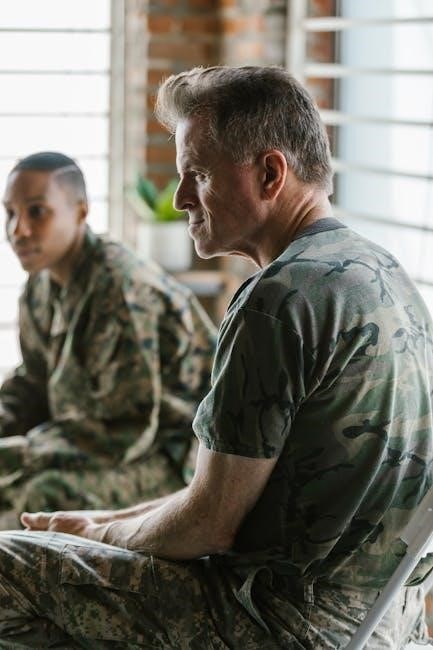
Key Elements of Initial Counseling
Initial counseling involves setting clear expectations, defining roles, and incorporating Army values to ensure alignment with unit standards and foster professional growth and accountability.
2.1 Setting Clear Expectations
Setting clear expectations during initial counseling is essential for a soldier’s successful integration into the unit. This involves outlining specific duties, responsibilities, and performance standards, ensuring the soldier understands their role. Expectations should cover both technical aspects, like MOS-specific tasks, and behavioral standards, such as adherence to Army values and professionalism. Leaders must also address punctuality, uniform standards, and communication practices. By clarifying these expectations upfront, misunderstandings are minimized, and a foundation is established for future performance evaluations. This process is documented on DA Form 4856, ensuring accountability and providing a reference point for both the soldier and leader.
2.2 Defining Job Roles and Responsibilities
Defining job roles and responsibilities is a critical component of initial counseling. It ensures soldiers understand their specific duties, tasks, and expectations within the unit. Leaders use DA Form 4856 to outline clear, measurable objectives aligned with the soldier’s Military Occupational Specialty (MOS) and unit goals. This clarity helps soldiers prioritize tasks, meet performance standards, and contribute effectively to the mission. By detailing responsibilities, leaders enable soldiers to focus on professional development and align their efforts with unit priorities. This step is vital for building accountability, improving performance, and fostering a sense of purpose. Clear role definition also enhances unit cohesion and mission readiness.
2.3 Incorporating Army Values
Incorporating Army Values into initial counseling ensures soldiers understand and internalize the ethical foundation of military service. Leaders emphasize the seven core values: loyalty, duty, respect, selfless service, honor, integrity, and personal courage. These values guide soldiers’ behavior and decision-making, fostering a culture of trust and accountability. During counseling, leaders discuss how these values apply to daily duties, professional conduct, and unit cohesion. By integrating Army Values, soldiers develop a moral compass that aligns with the Army’s mission and expectations. This foundation is essential for building disciplined, principled, and mission-ready service members. Leaders use DA Form 4856 to document how these values are reinforced, ensuring they become integral to each soldier’s professional identity and behavior.
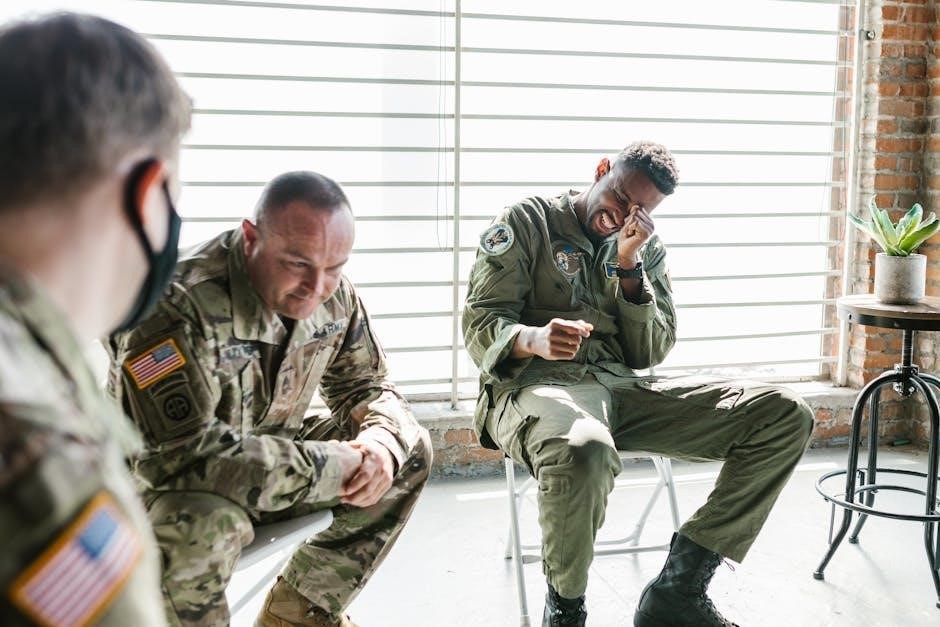
Types of Army Counseling
Army counseling includes performance, event-oriented, and professional growth categories, each addressing specific needs and documented on DA Form 4856 to guide soldier development and mission success.
3.1 Performance Counseling
Performance counseling focuses on evaluating a soldier’s duty performance over a specific period, providing feedback, and setting future goals. It is documented on DA Form 4856, ensuring accountability and progress tracking. This type of counseling helps identify strengths and areas for improvement, aligning individual performance with unit expectations. Leaders use it to guide professional development, reinforce positive behavior, and address shortcomings. Regular performance counseling fosters growth, improves readiness, and supports mission success. By maintaining detailed records, leaders can provide consistent feedback and monitor advancements, ensuring soldiers meet Army standards and contribute effectively to their roles.
3.2 Event-Oriented Counseling
Event-oriented counseling addresses specific situations, such as misconduct, achievements, or significant events requiring immediate attention. It aims to correct behavior, reinforce positive actions, or provide guidance in response to particular incidents. This type of counseling is documented on DA Form 4856 and focuses on the circumstances surrounding the event. Leaders use it to clarify expectations, address deficiencies, or recognize outstanding performance. Event-oriented counseling is crucial for maintaining unit standards and ensuring accountability. It provides a structured approach to resolving issues promptly, fostering a culture of responsibility and continuous improvement. By documenting these sessions, leaders can track progress and ensure alignment with Army values and mission requirements.
3.3 Professional Growth Counseling
Professional growth counseling focuses on a soldier’s long-term development, emphasizing career goals, education, and leadership skills. It is documented on DA Form 4856 and tailored to enhance individual potential. This type of counseling helps soldiers identify strengths, address weaknesses, and create actionable plans for advancement. Leaders use it to guide soldiers in achieving their professional aspirations while aligning with Army mission requirements. Professional growth counseling fosters a culture of continuous improvement and prepares soldiers for future roles. By setting realistic and achievable goals, it ensures soldiers are well-equipped to meet the challenges of their military careers. Regular follow-up sessions are essential to track progress and provide ongoing support.

Expectations and Standards

Army initial counseling sets clear expectations, covering job roles, responsibilities, and performance standards. It ensures soldiers understand their duties and align with unit goals and Army values.
4.1 Job Description and Performance Standards
Army initial counseling clearly outlines a soldier’s job description and performance standards, ensuring they understand their specific duties and responsibilities. This includes technical tasks tied to their MOS and behavioral expectations aligned with Army values. Leaders must articulate both the technical and professional aspects of the job, such as punctuality, uniform standards, and adherence to regulations. Performance standards are established to measure success and provide a baseline for future evaluations. Clear communication of these expectations prevents misunderstandings and ensures soldiers are prepared to meet unit goals. This foundation is critical for professional development and mission readiness. It also reinforces accountability and fosters a culture of excellence within the unit.
4.2 Adherence to Army Values
Adherence to Army values is a cornerstone of initial counseling, emphasizing the importance of living by the principles of loyalty, duty, respect, selfless service, honor, integrity, and personal courage. Soldiers are expected to embody these values in all aspects of their conduct, both on and off duty. Initial counseling reinforces the expectation that soldiers will uphold these standards, ensuring alignment with the Army’s ethical foundation. Leaders model these values, fostering a culture of integrity and mutual respect. Failure to adhere to Army values may result in corrective action, as these principles are essential for maintaining trust and discipline within the unit. This emphasis ensures soldiers understand their role in upholding the Army’s reputation and contributing to mission success.
4.3 Behavioral Expectations
Behavioral expectations are clearly outlined during initial counseling to ensure soldiers understand the standards of professional conduct. This includes punctuality, proper uniform wear, and respect for the chain of command. Leaders emphasize the importance of maintaining discipline, adhering to unit policies, and upholding Army regulations. Soldiers are expected to demonstrate self-control, accountability, and a commitment to teamwork. Behavioral expectations also encompass ethical behavior, honesty, and responsibility, aligning with Army values. Clear communication of these standards helps prevent misconduct and promotes a disciplined environment. Consistent enforcement of these expectations ensures unity and cohesion within the unit, fostering a culture of professionalism and readiness. This foundation is critical for individual and collective success.
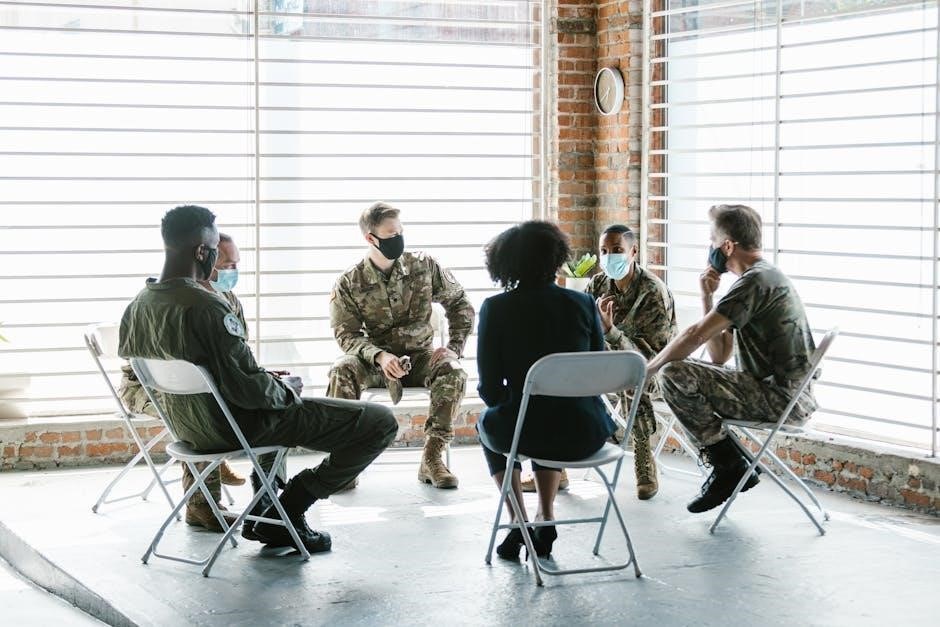
The Role of Army Values
Army values guide moral conduct and professional behavior, ensuring soldiers exemplify loyalty, duty, respect, selfless service, honor, integrity, and personal courage. They form the foundation of decision-making and behavior.
5.1 Living the Army Values
Living the Army Values is essential for fostering a culture of integrity and professionalism. Leaders must model these values, ensuring soldiers understand their importance in daily actions and decisions. Initial counseling emphasizes the expectation to embody values like duty, respect, and integrity. Soldiers are expected to uphold these standards consistently, both on and off duty. Failure to adhere to these values can result in corrective action, highlighting the critical role of counseling in reinforcing their significance. By integrating Army Values into counseling sessions, leaders create a foundation for ethical decision-making and professional growth, ensuring soldiers remain aligned with the Army’s mission and principles.
5.2 Importance of Self-Discipline
Soldiers must maintain high standards of self-discipline, as it is a cornerstone of military professionalism. Self-discipline ensures adherence to Army regulations, unit standards, and ethical conduct. It fosters accountability and personal responsibility, essential for mission success. Initial counseling highlights the importance of self-discipline, emphasizing its role in maintaining military bearing and readiness. Soldiers who demonstrate self-discipline are better equipped to follow orders, meet expectations, and contribute to unit cohesion. Examples include punctuality, proper uniform wear, and adherence to safety protocols. Failure to uphold self-discipline can lead to corrective action, underscoring the need for leaders to reinforce its significance during counseling sessions. Self-discipline is vital for a soldier’s professional development and the unit’s overall effectiveness.
5.3 Maintaining Military Bearing
Maintaining military bearing is essential for soldiers to project professionalism and respect for the Army’s standards. It encompasses proper posture, etiquette, and conduct, reflecting discipline and adherence to traditions. Military bearing fosters trust and confidence within the unit, reinforcing leadership and teamwork. Soldiers are expected to demonstrate bearing through actions like saluting, addressing superiors correctly, and maintaining a neat appearance. Initial counseling emphasizes the importance of military bearing as a foundation for professional growth and unit cohesion. Leaders must model these behaviors to inspire their subordinates. Proper military bearing enhances the Army’s image and contributes to mission success, ensuring soldiers are perceived as disciplined and capable individuals. It is a critical component of a soldier’s identity and effectiveness.
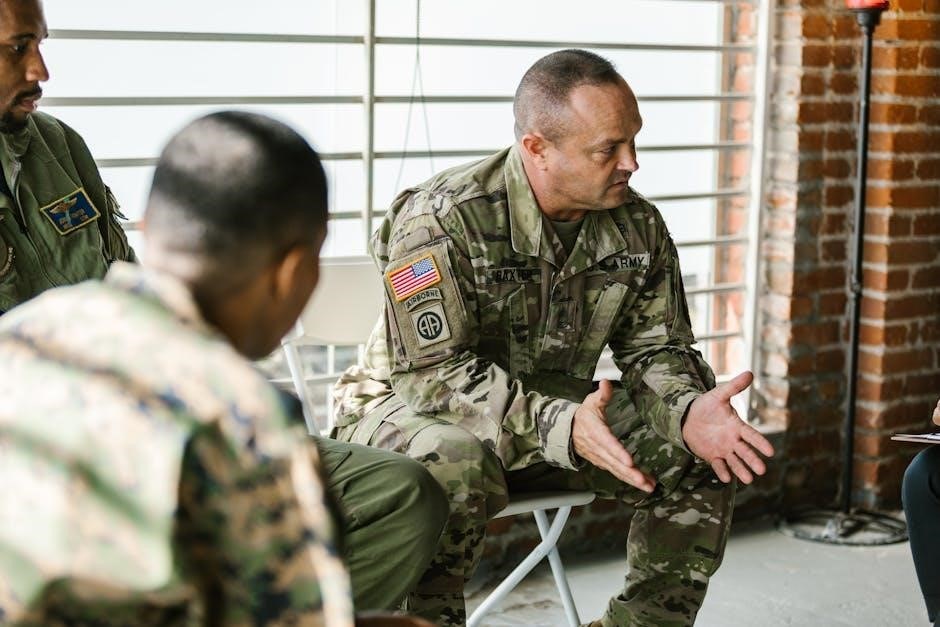
Communication in Counseling
Effective communication in counseling ensures clarity, understanding, and mutual respect. It involves active listening, clear articulation, and concise conveyance of information to foster collaboration and trust.
6.1 Effective Communication Techniques
Effective communication in Army counseling relies on active listening, clear articulation, and empathy. Leaders should maintain eye contact, ask open-ended questions, and paraphrase to ensure understanding. Using a non-judgmental tone fosters trust, while providing specific feedback helps soldiers improve. Encouraging open dialogue allows soldiers to express concerns freely, enhancing mutual respect. Regular follow-up discussions ensure ongoing support and accountability. These techniques promote a constructive environment, enabling soldiers to meet expectations and achieve personal growth. Proper documentation on DA Form 4856 ensures clarity and consistency, supporting future counseling sessions and performance evaluations. Effective communication is vital for building strong leader-soldier relationships and mission success.
6.2 Open Dialogue and Feedback
Open dialogue and feedback are essential components of effective Army counseling. Leaders should foster an environment where soldiers feel comfortable sharing their thoughts and concerns. This encourages transparency and trust, fostering a positive command climate. Constructive feedback, both positive and corrective, helps soldiers understand their strengths and areas for improvement. Leaders must ensure feedback is specific, timely, and actionable, allowing soldiers to grow personally and professionally. Encouraging two-way communication ensures mutual understanding and alignment with unit goals. Documenting feedback on DA Form 4856 provides a record for future reference and accountability. Regular follow-up discussions reinforce the importance of continuous improvement and support. Open dialogue and feedback are critical for building strong leader-soldier relationships and achieving mission success.
6.3 Avoiding Misunderstandings
Avoiding misunderstandings in Army counseling requires clear communication and active listening. Leaders must ensure their message is conveyed accurately, avoiding ambiguity or jargon. Soldiers should feel encouraged to ask questions to clarify expectations. Using DA Form 4856 ensures consistency and provides a written record, reducing the risk of miscommunication. Leaders should also summarize key points during discussions to confirm understanding. Regular follow-up sessions can address any lingering confusion or concerns. By fostering open dialogue and ensuring clarity, leaders can prevent misunderstandings that might hinder a soldier’s development or unit cohesion. Clear communication is vital for building trust and ensuring alignment with unit goals and Army values.

Documentation and Record Keeping
Accurate documentation is crucial for accountability and future reference. It supports soldier development, tracks progress, and ensures legal and administrative compliance, fostering transparency and professionalism in counseling.
7.1 DA Form 4856: Purpose and Format
DA Form 4856 is the Army’s standardized counseling document, designed to record and track counseling sessions effectively. Its primary purpose is to provide a structured format for leaders to document initial counseling, performance feedback, and developmental plans. The form includes sections for soldier and counselor information, the purpose of counseling, observations, a plan of action, and signatures. This ensures consistency and clarity in documentation. Leaders use it to set expectations, address performance issues, and support soldier growth. The form also serves as a legal record, making accurate completion essential for administrative and disciplinary purposes. Proper use of DA Form 4856 fosters accountability and transparency, aiding in professional development and mission success.
7.2 Accurate and Detailed Documentation
Accurate and detailed documentation is crucial in Army counseling to ensure clarity and accountability. Leaders must record specific observations, actions, and goals, avoiding vague statements. This provides a clear reference for future counseling sessions and performance evaluations. Detailed documentation also supports legal and administrative processes, protecting both the soldier and the counselor. Examples from DA Form 4856 demonstrate how to structure feedback effectively, ensuring consistency across all counseling types. By maintaining thorough records, leaders can track progress, identify trends, and make informed decisions. Soldiers benefit from clear expectations, while leaders uphold professionalism and fairness. Precise documentation fosters trust and transparency within the unit, aligning actions with Army standards and values.
7.3 Legal and Administrative Significance
DA Form 4856 holds significant legal and administrative importance, serving as an official record of counseling sessions. It provides evidence of discussions, agreements, and actions taken, protecting both the soldier and leader. This documentation can be critical in legal proceedings, disciplinary actions, or administrative hearings, ensuring accountability and transparency.
The form also plays a key role in performance evaluations and promotion decisions, offering a standardized method to assess a soldier’s progress. Accurate completion of DA Form 4856 ensures compliance with Army regulations and supports fair treatment of soldiers. It reinforces the Army’s commitment to maintaining high standards and upholding justice within the ranks.

Examples and Resources
Online resources provide numerous examples of Army initial counseling in PDF format, offering downloadable templates and guidance. Software tools also offer customizable templates for effective counseling preparation;
8.1 Online Resources for Counseling Examples
Online resources offer abundant examples of Army initial counseling in PDF format, providing accessible templates and guidance. Websites dedicated to military resources host downloadable samples, covering various counseling scenarios, such as performance and event-oriented discussions. These examples illustrate proper formatting and language, aiding leaders in documenting sessions effectively. They also include tips and best practices for conducting initial counseling, ensuring consistency and clarity. Soldiers and leaders can adapt these examples to meet individual needs, fostering professional growth and mission readiness. Additionally, these resources align with DA Form 4856, emphasizing the importance of accurate documentation. By utilizing these online tools, leaders can enhance their counseling skills, contributing to soldier development and unit success.
8.2 Software Tools for Counseling Preparation
Software tools like ACOs Counselor provide comprehensive support for Army counseling preparation. These tools offer templates, sample forms, and step-by-step guides to ensure effective counseling sessions. They assist leaders in structuring counseling discussions, creating development plans, and documenting progress efficiently. Features include automated form filling, tips for effective communication, and resources for addressing specific scenarios. These tools help leaders maintain consistency and professionalism in counseling, ensuring all necessary sections are covered. By utilizing these software solutions, leaders can streamline the counseling process, focus on soldier development, and maintain accurate records for future reference. They are invaluable for adapting counseling to individual needs and enhancing overall counseling effectiveness.
8.3 Sample DA Form 4856 Templates
Sample DA Form 4856 templates are widely available online, offering structured examples for various counseling scenarios. These templates provide a clear format for documenting initial counseling, performance reviews, and event-oriented discussions. Leaders can customize them to suit individual needs, ensuring consistency and professionalism. Examples include completed forms for job descriptions, performance goals, and developmental plans. Online resources often provide downloadable PDF versions, making it easy to access and adapt these templates. They serve as valuable guides for leaders, ensuring all key sections are addressed, such as strengths, areas for improvement, and action plans. These samples are essential for maintaining accurate and thorough counseling records, supporting soldier growth and mission success.

Best Practices for Leaders
Leaders should consistently use DA Form 4856, provide clear feedback, and tailor counseling to individual needs, fostering a culture of accountability and professional growth.
9.1 Tailoring Counseling to Individual Needs
Tailoring counseling to individual needs ensures personalized development and addresses unique challenges. Leaders should adapt their approach based on a soldier’s strengths, weaknesses, and career goals. This method fosters engagement and growth. For instance, using DA Form 4856 examples, leaders can create customized plans. Open dialogue helps identify specific areas for improvement. Regular feedback and follow-up reinforce progress. This approach not only enhances performance but also builds trust and confidence. Soldiers feel valued when their needs are prioritized, leading to higher satisfaction and retention. Effective tailored counseling is a cornerstone of successful leadership, ensuring each soldier thrives in their role and contributes to mission success.
9.2 Consistency in Counseling Sessions
Consistency in counseling sessions is crucial for maintaining standards and fostering trust. Regular, structured sessions ensure ongoing development and accountability. Leaders should use DA Form 4856 to document progress, providing a clear record of goals and achievements. Consistent communication reinforces expectations and guidelines, preventing misunderstandings. It also helps soldiers understand their role in achieving mission success. By maintaining a uniform approach, leaders create a predictable and fair environment. This consistency builds credibility and strengthens the leader-soldier relationship. Over time, it promotes a culture of accountability and continuous improvement, essential for unit cohesion and operational effectiveness. Consistency ensures that counseling remains a reliable tool for soldier development and mission readiness.
9.3 Follow-Up and Follow-Through
Effective follow-up and follow-through are essential for reinforcing the outcomes of counseling sessions. Leaders must regularly review a soldier’s progress, ensuring goals and commitments are met. This involves scheduling periodic check-ins and maintaining open communication. Follow-up actions demonstrate a leader’s commitment to a soldier’s development, fostering trust and accountability. It also allows for timely adjustments to plans, addressing challenges promptly. Consistent follow-through ensures that counseling initiatives yield tangible results, contributing to both individual growth and unit success. By tracking progress and providing feedback, leaders can identify areas needing improvement and celebrate achievements, ultimately enhancing the overall effectiveness of the counseling process and mission readiness.
Effective initial counseling is a strategic investment in soldier development, fostering a culture of open communication and mutual respect. It ensures alignment with Army values and mission success.
10.1 Summary of Key Points
Army initial counseling is a foundational process that orients new soldiers to unit standards, expectations, and values. It sets clear goals and promotes open communication, documented on DA Form 4856. This process ensures soldiers understand their roles, responsibilities, and performance standards, fostering a positive command climate. Effective counseling aligns soldiers with the unit’s mission and values, contributing to overall readiness. It addresses potential issues proactively and provides resources for growth. Leaders must model Army values and maintain consistency in counseling sessions. Accurate documentation on DA Form 4856 supports accountability and transparency, aiding in future evaluations and development. Ultimately, initial counseling is essential for soldier development and mission success, ensuring a strong foundation for future growth and unit cohesion.
10.2 Final Thoughts on Effective Counseling
Effective counseling is a cornerstone of soldier development, fostering growth, accountability, and mission readiness. Leaders must prioritize clear communication, empathy, and consistency, ensuring soldiers understand expectations and values. By leveraging tools like DA Form 4856, leaders can document progress and provide targeted feedback, promoting a culture of continuous improvement. Regular follow-up and genuine concern for soldier well-being reinforce trust and accountability. Effective counseling not only enhances individual performance but also strengthens unit cohesion and readiness. Leaders who invest time and effort into meaningful counseling contribute to the Army’s long-term success, ensuring soldiers are prepared to meet challenges and achieve their full potential.
10.3 The Impact on Soldier Development and Mission Success
Effective initial counseling significantly impacts soldier development and mission success by establishing clear expectations and fostering a culture of accountability. It ensures soldiers understand their roles, responsibilities, and the Army values, enabling them to contribute effectively to their units. Proper documentation through DA Form 4856 provides a roadmap for growth, helping leaders track progress and provide targeted feedback. This structured approach not only enhances individual performance but also strengthens unit cohesion, leading to improved readiness and mission accomplishment. By setting a strong foundation, initial counseling plays a pivotal role in developing capable, disciplined, and motivated soldiers who are essential for achieving organizational goals and upholding the Army’s standards.
